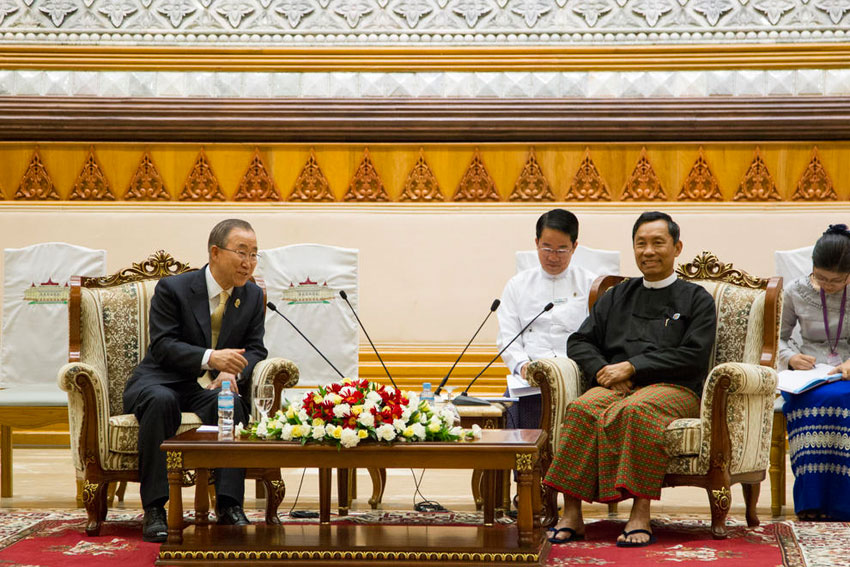World will benefit greatly from more future-oriented, integrated Asia – Ban
Asia is on the “leading edge” of 21st century solutions, but it is plagued by tensions rooted in another time including historical and territorial disputes that have to be managed and resolved peacefully” Mr. Ban told the 9th East-Asia Summit, held in Nay Pyi Taw.
“We know the absence of dialogue heightens the risk of escalation – even inadvertent conflict – due to misunderstanding or miscalculation,” Mr. Ban added, welcoming the Summit and its efforts to build an Asia-wide institutional framework for dialogue.
The Secretary-General called on Asian countries to expand their coordination and explore creating a new security architecture for closer regional cooperation, especially in the Northeast Asia. The world faces immense challenges that cannot be addressed by one conflict or organization alone, he said.
Conflict continues to rage in Syria, Iraq and beyond. The Ebola virus continues its deadly grip on West Africa. Threats such as drug trafficking, transnational crime and terrorism are growing in intensity and feeding off each other.
Mr. Ban applauded the initiative of the Republic of Korea to complement existing security or coordination mechanisms and explore ways to fill the current gaps in dialogue. He also welcomed efforts such as those by China and Japan to find a constructive, positive path forward.
Various international issues and challenges including regional maritime security, the proliferation of weapons of mass destruction, pandemics, natural disasters, illegal trafficking in arms, narcotics and people, and environmental degradation depend on enhanced cooperation among the countries of Asia.
“I thank many countries around this table for stepping up in solidarity to respond to the unprecedented Ebola outbreak in West Africa,” Mr. Ban said, urging the need to help speed up efforts to first get the crisis under control with an “all hands on deck” approach.
Efforts are paying dividends with the rate of new Ebola cases showing encouraging signs of slowing. But as caseloads go down in some areas, they are rising in others. Huge gaps remain in funding, equipment and medical personnel.
As for regional issues, the Secretary-General called for more to be done to reduce the risks of disasters in Asia. Mr. Ban commended leadership on improving disaster response capacities – and look forward to active participation in the third UN World Conference on Disaster Risk Reduction, in Sendai, Japan next March.
Next year will be pivotal for three important priorities, namely, the target year of the Millennium Development Goals (MDGs), shaping the post-2015 development agenda, the sustainable development goals and addressing climate change.
The Secretary-General commended yesterday’s announcement by the Governments of China and the United States of their post-2020 action on climate change.
All countries, especially all major economies, should follow the lead of the world’s two largest economies and announce ambitious post-2020 targets no later than the first quarter of 2015.
On the margins of the Summit, the Secretary-General met with Myanmar’s President Thein Sein commending him for advancing the peace process between the Government and ethnic armed groups. Mr. Ban underlined the need for all stakeholders to move toward signing a ceasefire and beginning a political dialogue.
Concerning the situation in Rakhine and the continued polarization between the communities, Mr. Ban took note of the recent developments, including the appointment of a new Chief Minister and consultations on the three-year Action Plan. Underlying causes had to be addressed through substantive and early action, including on the issue of citizenship.
The establishment of the Office of the High Commissioner for Human Rights in the country would help further strengthen human rights, the UN Chief said.
Mr. Ban also met with Thura U Shwe Mann, Speaker of the Lower House of Myanmar’s Parliament, to highlight the positive role it has played. Debates in Parliament on media laws, hate speech, interfaith marriage, religious conversion, and other issues would help promote democracy and communal harmony.
The Secretary-General also underlined the role the Parliament could play in ensuring that the upcoming general election process would be credible, inclusive and transparent.
Speaking with the Chairperson of the National League for Democracy (NLD), Daw Aung San Suu Kyi, Mr. Ban commended her important role in leading the opposition and her positive contributions toward strengthening the democratic fabric of Myanmar.
The Secretary-General and Daw Aung San Suu Kyi exchanged views on the upcoming elections, constitutional reform and national reconciliation in Rakhine and elsewhere in the country. There was great expectation that the upcoming elections in 2015 would be transparent and fair.
Mr. Ban also met with Russian Prime Minister Dmitry Medvedev to discuss the conflict in Ukraine. He expressed strong concern at the current situation and its impact on the relations between Russia and Europe as well as the United States.
Russia should use its considerable influence to help de-escalate the conflict and bring Ukraine back to a path of peace and stability. All parties should ensure that the Minsk Protocol be fully implemented.
Prime Minister Medvedev and Mr. Ban also discussed the post-2015 development agenda and climate change. In addition, the Secretary-General thanked Russia for its role in the Ebola response.









